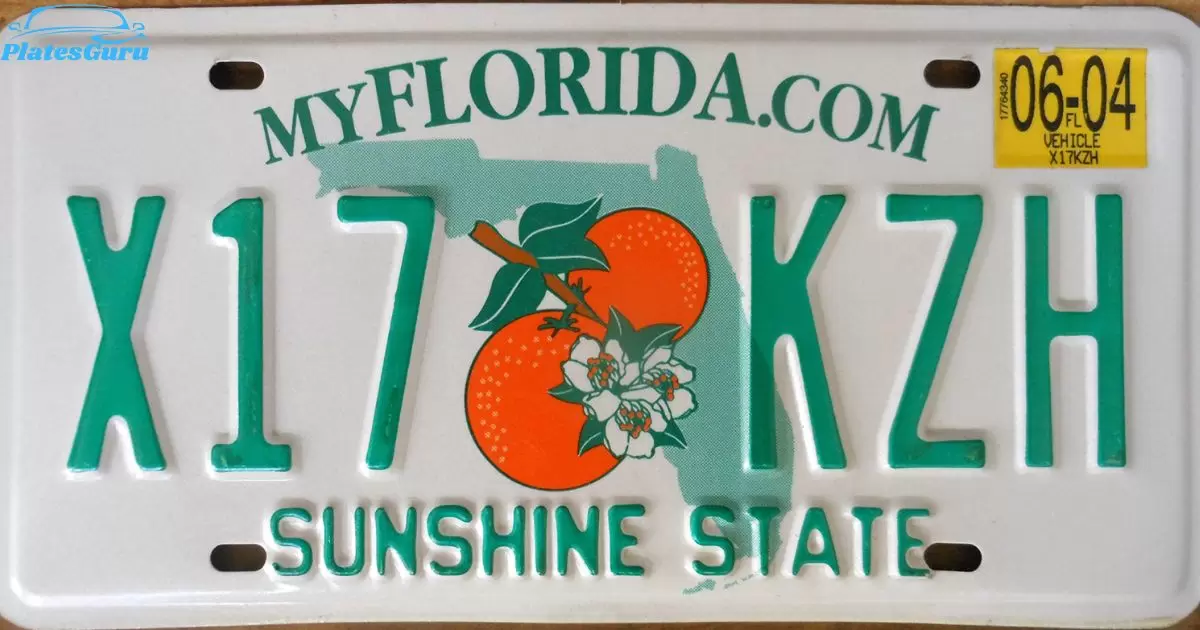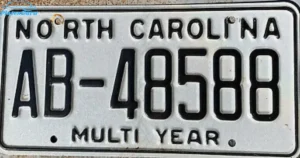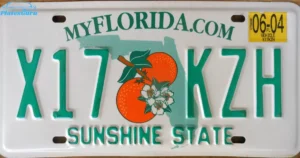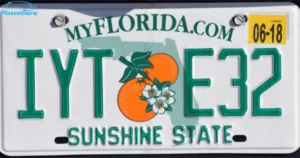In Florida, the cost for a new license plate is $28 for standard plates. This fee is required when registering a vehicle in the state for the first time or when replacing an existing plate. Florida requires an initial registration fee of $225 for new residents or those who are registering a car in Florida for the first time. This initial registration fee is a one-time charge. If you’re transferring a vehicle title, you might also need to account for a title transfer fee which can vary between $75.25 and $85.25, depending on the specifics of the transfer.
There are also annual registration fees based on the vehicle’s weight. For example, vehicles weighing between 0-2499 pounds are charged $27.60 per year, those between 2500-3499 pounds at $35.60 per year, and vehicles weighing 3500 pounds or more at $45.60 per year. These fees are for private use vehicles and are designed to cover the cost of the vehicle’s registration and the maintenance of public roadways.
Introduction to Florida’s License Plate System
Navigating the process of obtaining a new license plate in Florida can initially seem like a daunting task given the myriad of rules and fees involved. However, understanding this process is crucial for both new residents and current residents alike who are looking to either register a new vehicle or replace an existing license plate. Florida’s Department of Highway Safety and Motor Vehicles (DHSMV) oversees the issuance of license plates, ensuring that every vehicle on the road is properly registered and identifiable.
Florida’s license plate system is designed to not only comply with state laws but also to offer a variety of options to vehicle owners. From standard plates to personalized and specialty plates, the system accommodates the preferences and needs of all drivers. This flexibility, however, comes with its own set of regulations and fees, which can vary depending on the type of plate and the vehicle being registered.
The importance of having a valid license plate cannot be overstated, as it facilitates the identification of vehicles by law enforcement, aids in the management of road safety, and ensures compliance with state taxation and insurance requirements. With Florida’s vast and diverse landscape, from the bustling streets of Miami to the quiet roads of the Panhandle, a functioning license plate system is vital for maintaining order and safety on the roads.
Understanding Florida’s License Plate Fees
When discussing new license plates in Florida, it’s essential to grasp what exactly these fees entail. Florida’s Department of Highway Safety and Motor Vehicles (DHSMV) categorizes the costs associated with license plates into several key components, each serving a specific purpose in the vehicle registration process. These fees not only cover the production and issuance of the license plate itself but also contribute to state road maintenance and safety programs.
Initial Registration Fee
One of the primary costs associated with obtaining a new license plate in Florida is the initial registration fee. This one-time fee is applicable to those registering a vehicle in Florida for the first time. The rationale behind this charge is to integrate the vehicle into Florida’s road and safety network, ensuring that all vehicles meet the state’s regulatory and safety standards.
License Plate Fee
The license plate fee directly relates to the cost of producing and issuing the physical license plate. In Florida, this fee varies depending on the type of plate chosen. Standard plates, specialty plates, and personalized plates each have different pricing structures, reflecting the varying levels of customization and production effort involved.
Title Transfer and Registration Fees
For individuals purchasing a vehicle, whether new or used, a title transfer fee is required to officially document the change of ownership. This fee accompanies the registration fee, which is an annual cost covering the vehicle’s legal operation on Florida roads. These fees can vary based on the vehicle’s weight and type, with specific rates set for cars, trucks, motorcycles, and other vehicle categories.
Key Factors Influencing Fees
Several factors can influence the total cost of obtaining a new license plate in Florida, including:
- Vehicle Type: The type of vehicle being registered (e.g., car, motorcycle, truck) affects the registration fee due to differing weight classes and intended use.
- Plate Type: Standard, specialty, and personalized plates have different fees, with specialty and personalized options typically costing more due to their custom nature.
- Registration Period: Florida offers options for annual or biennial registration, affecting the total cost upfront. Choosing a longer registration period can offer convenience and sometimes cost savings over yearly renewals.
Navigating Florida’s License Plate System
Obtaining a new license plate in Florida involves more than just paying the fees; it’s a multifaceted process that reflects the state’s commitment to road safety, environmental conservation, and vehicle identification. Here, we break down the full story behind acquiring a new license plate in Florida, from choosing the right plate to understanding the renewal process.
Choosing the Right License Plate
Florida offers a wide array of license plate options to suit the preferences and needs of its diverse population. The standard plate, often featuring the state’s iconic orange blossom and oranges, serves as the default option. However, residents can opt for specialty plates that support various causes and institutions or personalize their plates with custom lettering and numbers.
Specialty Plates
Specialty plates in Florida support a range of causes, from environmental conservation to education and veteran services. A portion of the fees collected from these plates goes directly to the associated cause, allowing vehicle owners to support their interests actively.
Personalized Plates
For those looking to add a personal touch to their vehicle, Florida allows personalized plates with custom lettering and numbers. This option lets individuals express their personality or support for a cause through their vehicle’s license plate.
The Registration Process
Registering a vehicle and obtaining a license plate in Florida is a straightforward process, but it requires careful attention to detail. Vehicle owners must provide proof of ownership, such as a title or bill of sale, and verify their identity and Florida residency. Additionally, valid auto insurance coverage is a prerequisite for registration, ensuring all vehicles on the road are insured according to state laws.
Online, In-Person, or Mail Registration
Florida’s DHSMV offers multiple registration options to accommodate different preferences. Residents can choose to register their vehicles online, in person at a local DHSMV office, or via mail. Each method has its requirements and steps, but all aim to streamline the process for convenience and efficiency.
Renewal and Maintenance
License plate renewal in Florida is an annual or biennial requirement, depending on the owner’s preference. The state notifies vehicle owners of upcoming renewals, providing ample time to complete the process. Failure to renew on time can result in late fees and potential legal issues, underscoring the importance of timely renewal.
Keeping Your Plate Up-to-Date
Maintaining a current registration and adhering to Florida’s license plate laws is crucial for all vehicle owners. This includes ensuring the license plate is visible and legible, replacing lost or damaged plates promptly, and updating registration details following a move or sale of the vehicle.
Key Takeaways
- Variety of Choices: Florida’s diverse range of license plate options, including standard, specialty, and personalized plates, allows residents to express their personalities or support causes important to them.
- Understanding Fees: The initial registration fee, license plate fee, and title transfer fees are critical components of the total cost. These fees fund state road maintenance, safety programs, and specific causes through specialty plates.
- The Registration Process: Offering flexibility, the state allows vehicle registration online, in-person, or by mail, catering to the convenience of all residents. Ensuring valid auto insurance and providing proof of ownership are non-negotiable prerequisites.
- Renewal and Maintenance: Keeping your license plate and registration up to date is crucial. Florida facilitates this with reminders for renewal, which can be completed online, ensuring continuous compliance with state regulations.
Must Read this post: How Long Does A Multi Year Tag Last In Nc?
FAQs
Can I transfer my license plate to a new vehicle in Florida?
Yes, Florida allows license plates to be transferred to a new vehicle, provided the owner remains the same. This process is part of the vehicle registration process for the new vehicle.
How often do I need to renew my license plate in Florida?
License plates in Florida need to be renewed annually or biennially, depending on the option chosen by the vehicle owner.
What happens if I don’t renew my license plate on time?
Failure to renew your license plate by the expiration date can result in late fees, and continued non-compliance may lead to legal issues, including fines and the potential impoundment of the vehicle.
Are there any discounts available for license plate fees in Florida?
Certain groups, such as veterans or disabled individuals, may be eligible for discounts or exemptions on some fees. It’s advisable to consult directly with the Florida DHSMV or a local tax collector’s office for specific eligibility criteria.
Conclusion
Navigating the process of acquiring a new license plate in Florida involves understanding various fees and regulations set by the Florida Department of Highway Safety and Motor Vehicles (DHSMV). The system offers an array of plate types including standard, specialty, and personalized plates, each with specific costs. The initial registration fee of $225, applicable to new residents or first-time registrants, and a $28 license plate fee form the base costs.
Additional fees, like the title transfer fee ranging between $75.25 and $85.25 and annual registration fees based on vehicle weight, further contribute to the overall expense. This comprehensive framework, designed to support road safety, environmental conservation, and vehicle identification, highlights the importance of maintaining current registration and adhering to state laws, ensuring a seamless integration into Florida’s vibrant and diverse driving landscape.








